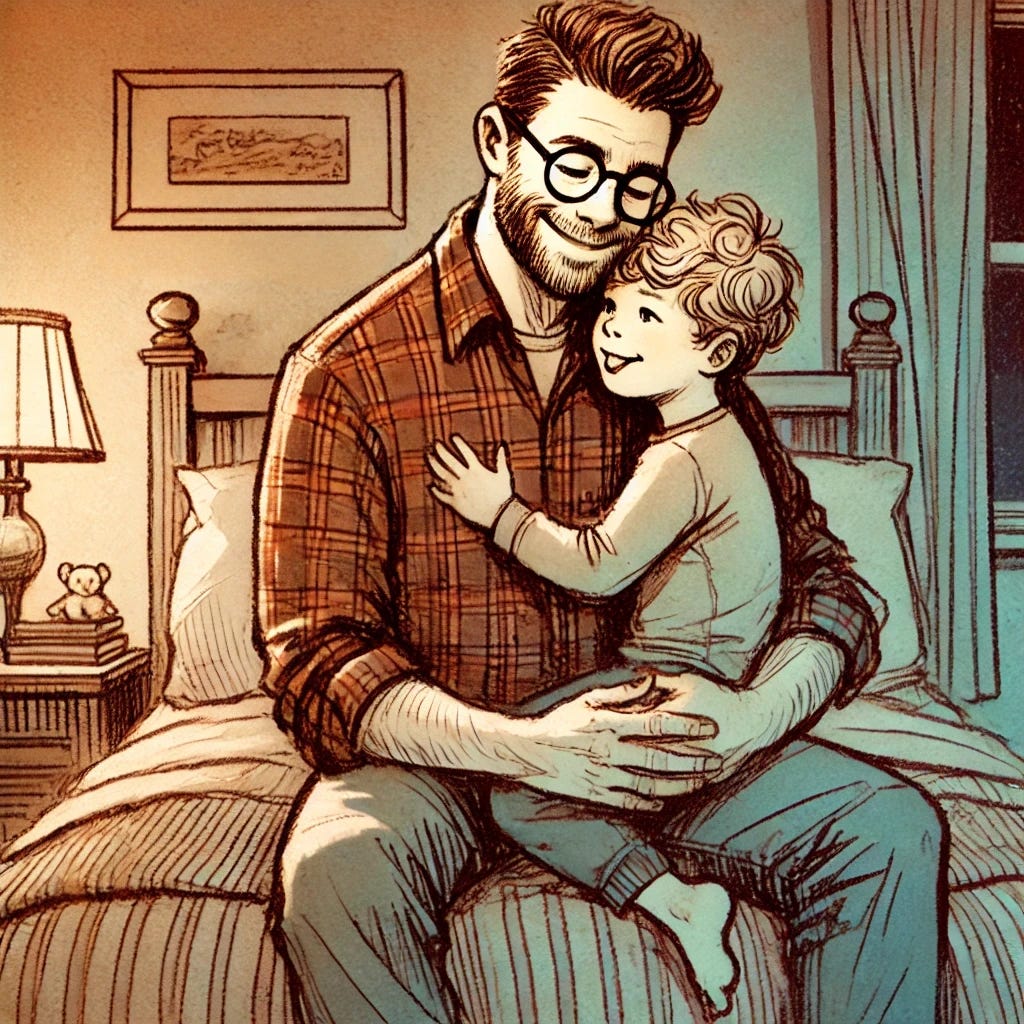The Work of Repair
Teaching our kids to grow in the ways we couldn’t.
"I am SO tired of the SCREAMING!"
My left ear was ringing, and my son looked like a frightened coyote, pressed up against the toddler rail of his bed, red-faced, bearing his teeth. It was bedtime. It was supposed to be chill and serene. But the tenor of the moment had shot to 11. Crumpled on the floor behind him was the ribbon of a medal he'd received for completing the summer soccer program. Two minutes ago, I was reading him How the Grinch Stole Christmas. He'd insisted on holding the medal for story time, but instead, he started swinging it. I gently warned him twice to stop, then—SMACK! The medal hit me square in the left wrist bone, sending a shooting pain up my arm.
"OW!" I yelled, then, clenching my teeth, "Shhhhhhit! That HURT."
I stopped for a moment to collect myself. I had raised my voice and cursed—two things I'd done liberally most of my life, but I try never to do with my kids. I closed my eyes, took a few deep breaths, and looked at him with the gentlest eyes I could manage.
"Buddy," I started. "I told you to—"
He opened his mouth wide. It felt like he was millimeters from my eardrum when he let out a blood-curdling scream.
I've done things I regretted before they even happened. Proactive guilt—it rushes in, then I act.
"I am SO tired of the SCREAMING!"
The moment it came out, my guilt doubled. I turned away and sat on the opposite side of the bed as my son burst into tears. I started to turn to console him when my wife opened the door. My guilt rounded second and headed for third.
She consoled him instead. I explained my part in the mess. She left to get him a drink.
I had very young parents in the eighties and early nineties. Mister Rogers was the only adult who really made an effort to help me understand my emotions. My wife and I wanted to do our best to cultivate emotional intelligence in our children. Mistakes are inevitable. Our kids deserve the respect of a genuine apology.
The truth is, I don’t write about parenting to teach. I write about parenting to learn. I’ve been a writer my whole life. But no one’s born knowing how to parent. Most days, I still don’t. So, I use writing to get better at the thing that matters more.
One thing I’ve learned—one thing I’m still learning—is how to forgive myself. That matters most when your kid is too young to understand shame… or grace. Dr. Becky Kennedy, author of the book Good Inside, helped me see that.
“Our parenting doesn’t have to be defined by our moments of struggle,” she writes. “It should be defined by whether or not we connect with our kids after the struggle.”
One of the most powerful ideas in Good Inside is this: we can change the memory in our kids’ bodies by reconnecting after a rupture. She calls this “repair.”
How many of us grew up with parents who told us we "made them" get angry, yell, or worse? Now, it’s our job to teach our kids that they don’t make us do anything.
That’s why I turned to my son as he sniveled, still red-faced with a quivering lip. I put my arm around him and looked him in the eye—this time with real gentleness.
"I'm so sorry, buddy. I was feeling frustrated and hurt, and I yelled. That wasn’t okay. It’s not your fault. I’m working on handling my big feelings better. I love you."
He melted into my arms. "I love you too, Daddy."
Nothing zaps shame like hearing an authentic, unforced “I love you” from your kid.
He didn’t make me lose my cool. I lost it. And he deserves to know that my emotions are not his responsibility. It's the only way he'll learn to manage his own.
It’s cliché to say, “We want to do better for our kids than our parents did for us,” but it’s cliché for a reason. It should be every parent's goal. Step one to achieving that goal is repair. If we want our kids to become better than we were, we have to show them how to repair what we couldn’t.
Affiliate Disclaimer
Paternal Progress participates in the Bookshop.org affiliate program. This means that when you purchase books through the links on this page, I may receive a small commission of 10 percent from each sale. This helps support my work at Paternal Progress without any extra cost to you. I only recommend books I genuinely believe will benefit you and your family. Thank you for supporting my site and local bookstores!




Agreed. When done genuinely, saying sorry can be a powerful act that demonstrates strength, builds relationships, and promotes healing!